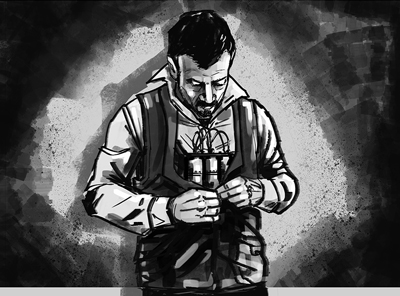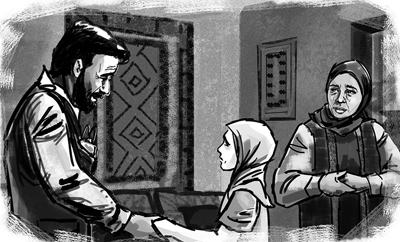 I’d like to ask for your prayers for some dear friends who’ve been a tremendous help to me. I was praying for them today and got the verse from Psalm 41:1, “Blessed is he that considers the poor, the Lord will deliver him in time of trouble.”
I’d like to ask for your prayers for some dear friends who’ve been a tremendous help to me. I was praying for them today and got the verse from Psalm 41:1, “Blessed is he that considers the poor, the Lord will deliver him in time of trouble.”
I’ll explain. About 18 months ago a man I hardly knew at the time invited me to coffee. The result of that meeting was that he and his wife began to support me in my producing the prophecies of Daniel videos to the degree that I was able to work on them full time. Since then 6 videos have been done, 3 full length and 3 supplementary one. And there’s been a good start on getting these videos into several foreign languages. Also I’ve been able to post articles on my two web sites around once or twice a week during that time.
It’s been an incredible blessing to have their help in this way. And actually, if any of you have gotten something out of the videos or articles I’ve been doing, it’s this couple who’ve helped me to be able to have the support so I’d have the time to work on these.
It’s easy to have some type of stereotypical picture of the greedy, selfish, capitalist rich, gobbling up the poor and destroying the world. Maybe there are some like that. But my experience with these folks has been that they’ve been some of the more generous people I’ve ever known, concerned about others on an international scale and also on an individual scale. I’ll tell you one more testimony about them and then share my prayer request for them.
 They’d been helping me for months to get the work done on the video series. Then one day my friend said, “You know a lot of missionaries, don’t you?” I paused and said that, yes, I did. So he said, “Well, do they need any help?” I paused again and again said yes, they did.
They’d been helping me for months to get the work done on the video series. Then one day my friend said, “You know a lot of missionaries, don’t you?” I paused and said that, yes, I did. So he said, “Well, do they need any help?” I paused again and again said yes, they did.
And it took me about a week for the idea to get through to me but my friend was wanting to share his prosperity with those on the mission field and he was asking if I’d be a conduit for that. The Lord one day almost had to prod or rebuke me for my slowness to catch on.
But since that time I’ve been able to be in contact with friends in many countries, mostly Sub-Saharan Africa and Eastern Europe and a relatively large amount of mission gifts have gone out to folks. As a result, thousands of Bibles and 10’s of thousands of Gospels of John have been made available throughout those areas, as well as mission gifts to those doing seminars in Uganda and other things like this. These people are like what the Bible talks about “cheerful givers” (II Corinthians 9:7). In their eyes they have “freely received” and so they “freely give” (Matthew 10:8).
These friends of mine now need our prayers.
I don’t know how much you keep up with it but there have been some recent drastic upheavals in some sectors of the international business outlook. This new economic turbulence has had a major impact on their company. There’s actually a question mark over whether they will still be able to be a help to me at all and we’re going to meet together soon.
 But I thought that the least I could do is to bring this dear couple before you and ask for your prayers. They themselves have done mission work and have been to some pretty risky places that I’ve never ventured to, where they were passing out tracts there in order to win souls. They are a brother and sister who’ve willingly shared their abundance to help the work I’ve been involved with and also to help missionaries and the poor in many countries.
But I thought that the least I could do is to bring this dear couple before you and ask for your prayers. They themselves have done mission work and have been to some pretty risky places that I’ve never ventured to, where they were passing out tracts there in order to win souls. They are a brother and sister who’ve willingly shared their abundance to help the work I’ve been involved with and also to help missionaries and the poor in many countries.
You don’t really need to know their names or more details than this. They remind me of another article I wrote a while back, called “Texas People”, about people from Texas that most folks don’t know about. But this is a time of trouble for them. They have people they employ, they have a family and they’ve constantly been trying to give to others. Could you please support these dear ones in prayer at this time? Their industry is going through strong upheavals and they’re seeking to find a way through this storm that’s upon their company and their lives. Thanks so much.
And perhaps you could also pray for me at this time. I’ve been aiming to make a mission trip to Romania, to visit churches in Bulgaria and to be in Christian refugee camps in the Middle East in around 3 months. These new changes bring uncertainly over this possible trip. Thanks so much for your prayers for my dear friends and supporters and for my ministry as well at this time.
Your friend in Him, Mark






 “
“ much you feel you need to get further involved. They’re a “tar baby”.
much you feel you need to get further involved. They’re a “tar baby”.
























 I know a man who lives in [West Europe] who used to be a “hodja”. That is a Muslim priest (you know, those who serve in a mosque and sing in Arabic). He has a wonderful testimony of how he became a Christian.
I know a man who lives in [West Europe] who used to be a “hodja”. That is a Muslim priest (you know, those who serve in a mosque and sing in Arabic). He has a wonderful testimony of how he became a Christian.
